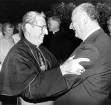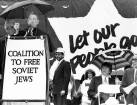


Cardinal John O’Connor, who as Archbishop of New York cultivated and cherished his strong ties to the Jewish community, was born of a mother who was born Jewish.
It is not known whether he knew that his mother, Dorothy Gumple O’Connor, was born Jewish. She converted to Catholicism before she met and married Thomas O’Connor, the late cardinal’s father. Mary O’Connor Ward, the cardinal’s sister, told CNY in an exclusive interview that her mother never spoke about having belonged to another faith.
The fact that Mrs. O’Connor was Jewish by birth came to light during a genealogical search undertaken by Mrs. Ward at the prompting of one of her daughters, Eileen Ward Christian, who had begun digging into the family’s history. Mrs. Ward said in an interview that when she was growing up she surmised that her mother was a convert, but that the family never discussed the matter.
Asked whether Cardinal O’Connor was aware of his Jewish lineage, she said, “I have no way of knowing that.” But she added, “I just don’t understand, if he knew, why something wouldn’t have come up before. He was so close to the Jewish community.”
Musing about his probable reaction to the news, she said, “I think he would have been very proud of it.” She said that she was very proud when she discovered her Jewish ancestry, and she noted that Cardinal O’Connor often spoke of the Jewish people as “our elder brothers” in faith.
“I don’t think you can be a Catholic and not feel that connection,” Mrs. Ward said.
Cardinal O’Connor apparently felt that connection in ways that, in retrospect, seem prophetic. On May 3, 1987, he watched thousands march down Fifth Avenue protesting the oppression of Soviet Jews. Later he joined the protesters at a rally near the United Nations and told them, “As I stood on the steps of St. Patrick’s Cathedral this morning and watched you stream by, I could only be proud of those who streamed out of Egypt several thousand years ago, winning freedom for themselves and for all of us. They are your ancestors, and they are mine.”
He added, “I am proud to be this day, with you, a Jew.”
At a synagogue service in 1988 commemorating the 50th anniversary of Kristallnacht, when Nazis destroyed synagogues and Jewish homes and stores in Germany and Austria, the cardinal told the congregation that he had placed a candle in the window of his residence on Madison Avenue. “That candle says, to those who would accuse, ‘Paint your swastika on the walls of my house, because herein lives a spiritual Semite,’ ” he said.
Reacting with immense joy to the news about the cardinal’s heritage was Mother Agnes Mary Donovan, S.V., superior general of the Sisters of Life, the women’s religious congregation Cardinal O’Connor founded in 1991. In an interview, Mother Agnes spoke about the cardinal’s 1975 visit to the Dachau concentration camp, which affected him profoundly for the rest of his life. He came away from the site with a deep conviction of the dignity and sacredness of every human life, at every stage, in every condition.
Mother Agnes said all of the sisters in the congregation were overjoyed and deeply moved by the news of their founder’s Jewish heritage.
“It leaves us with a greater wonder and awe,” she said, “at the magnificence of God’s grace, at the gift of a charism of life given to a priest…who did not know that he was Jewish, a gift of grace given by God in one of the 20th century’s darkest places.”
From that time on, Mother Agnes said, the cardinal spoke about the sacredness of human life in every homily he preached. He expressed that conviction and fulfilled a long-cherished goal when he founded the Sisters of Life to promote the dignity of all life through prayer and work. The sisters’ ministries include the care of pregnant women in need and of persons hurt by abortion, as well as educational presentations on the life issues.
Cardinal O’Connor was the Archbishop of New York from his appointment by Pope John Paul II in 1984 until his death at age 80 on May 3, 2000. His relationship with the Jewish community in New York was strong from the beginning, and it was rooted in actions as well as words. The cardinal was one of the key movers behind the Vatican’s recognition of the State of Israel, which began with the “Fundamental Agreement” in 1993 and was formalized with the opening of a Vatican nunciature in Israel and an Israeli embassy at the Vatican in 1994. He was a vocal supporter of Jews and Jewish causes, and he often spoke before Jewish groups and organizations. But to many Jews in New York, he was more than a leader in the field of interfaith affairs. He was a friend.
His relationship with Mayor Ed Koch was so close that the two men wrote a book together, “His Eminence and Hizzoner,” in which they offered opinions on many issues of public life, including those that involve Church and state. They revealed their disagreements, but also their friendship and respect for each other.
Shortly before the cardinal celebrated his 80th birthday, on Jan. 15, 2000, several Jewish leaders praised the cardinal in interviews with CNY. The festive occasion was bittersweet; the cardinal was suffering from the cancer that would take his life four months later, so the words of tribute were especially poignant.
Abraham Foxman, national director of the ADL, called Cardinal O’Connor “God’s gift to New York and a special gift to the Jewish community.”
“He has learned to understand our sensitivities and our hopes—he has traveled that road so well—that he could be considered a leader in our community,” Foxman said.
At the start of the High Holy Days the previous year, Cardinal O’Connor had sent a letter to the Jewish community asking pardon “for any member of the Catholic Church, high or low, including myself, who may have harmed you or your forebears in any way.” Rabbi Ronald B. Sobel, at that time the leader of Temple Emanu-El in Manhattan, told CNY that the letter “was as heart-moving and soul-touching a statement as the Jewish people have ever received from any prince of the Church…My love for His Eminence is profound.”
Rabbi Sobel also said, “Within the American Catholic hierarchy past and present, the Jewish people have had no greater friend” than Cardinal O’Connor.
The discovery of the cardinal’s Jewish background began when his sister, Mrs. Ward, found that their mother’s parents, Tina and Gustav Gumple, had been buried in a Jewish cemetery in Bridgeport, Conn., where they had lived. Mrs. Gumple died in the 1800s, and at the time, no woman who was not Jewish could have been buried in a Jewish cemetery, Mrs. Ward said.
Further research led Mrs. Ward and her daughter to the archives of the Archdiocese of Philadelphia, where the marriage record for Dorothy and Thomas O’Connor revealed that Dorothy Gumple had been baptized at Sacred Heart Church in Bridgeport, Conn., on April 3, 1908. She was 19 at the time.
“What brought it about, I’ll never know,” Mrs. Ward said. “None of us will ever know why she became a Catholic.” Later Dorothy Gumple went to Atlantic City where her sister lived, and through her sister’s husband she met Thomas O’Connor. They married on Dec. 26, 1909.
“I just drew my own conclusion that my mother was a convert. The only way I knew (was that) she had a sister who didn’t go to church,” Mrs. Ward said. She added that she and her brother John, the future cardinal, were “very close” but did not discuss their mother’s religious background.
Mrs. Ward reaffirmed what her brother had often said: Their mother was a deeply devout Catholic, a woman of prayer who literally died while sitting in a chair and saying the Rosary.
Mrs. Ward added that her brother might have thought that their mother was originally Lutheran, because her parents, Tina and Gustav Gumple, came to the United States from Prussia.
There is some support for that theory. Sister Maris Stella Karalekas of the Sisters of Life has been researching the life of Cardinal O’Connor for several years. She spoke with a Lutheran pastor and former U.S. Navy chaplain, the Rev. George Evans. He told her that the future Cardinal O’Connor, when he was Chief of Navy Chaplains, told him that he himself might have been a Lutheran, because his mother had been Lutheran.
Sister Maris Stella is convinced that Cardinal O’Connor did not know that his mother were born Jewish.
“If he did know,” she said, “he would have been so proud of it.” She added, “It’s quite a wonder to me. It’s something so beautiful, that God chose him as this instrument of grace in the Church.” She also reflected on “the events that affected him.”
“The men and women who died at Dachau shaped his adult life,” she said. “They could have been his relatives. He was so deeply connected to the Jewish people.”